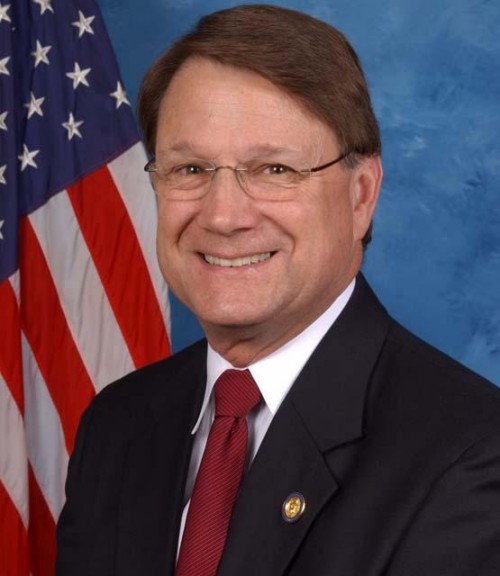
Zane Williams
December 27, 2010Colonels finding more balance in non-conference schedule
December 29, 2010Charlie Melancon’s third and final term as the 3rd Congressional District representative in the U.S. House is in its twilight, with only 13 days remaining before the Democrat is replaced by Republican congressman-elect Jeff Landry.
Melancon reflected on his three terms, which were plagued by both natural and man-made disasters, offered a solution to a shambled Washington system and discussed his future prospects in a telephone interview with the Tri-Parish Times Thursday.
“When I first ran for the House, it wasn’t about politics,” Melancon said after disregarding a return to the political arena. “It was about I felt that I could come in and make a difference. I guess to the extent that I had hoped, I failed because of the way the system is.”
Melancon’s congressional career was by no means typical. Eight months after he took office, hurricanes Katrina and Rita made landfall, followed three years later by Gustav and Ike.
In April of 2010, his focus was shifted to the aftermath of the Deepwater Horizon explosion, which killed 11 people, spewed millions of barrels of oil into the Gulf of Mexico and was followed by a government-imposed ban on offshore drilling.
As the 3rd District representative, his priorities remained consistent in that he was charged with coastal restoration and hurricane protection from the outset, but he had the added dilemma of helping revitalize the area after the catastrophes.
“As I’ve told my friends as we talked, I don’t look at my six years as would I would call a traditional legislative career for a member of Congress,” the congressman said. “Particularly after the hurricanes, trying to make sure that people who had problems were helped the best we could and on a daily basis, we had a lot of that.”
Although the congressman was unable to pass a major piece of legislation bearing his name, he did win funds for hurricane protection and recovery, coastal restoration and job creation by using other lawmakers’ bills as a vehicle.
“There are some things with the national catastrophic insurance reform, some of the Stafford Act, that were problematic after Katrina that the government couldn’t respond to,” Melancon said. “We got money not only for LA [Highway] 1 elevation from Fourchon but also for Morganza to the Gulf, got monies in the OCS (Outer Continental Shelf) [oil rig] leasing bill, and got expansion of the eastern Gulf drilling areas legislated.
“I’ve had a lot of successes, not anything that’s titled a Melancon bill, but in pieces of legislation that I was able to get elements in that fit with the bills that were moving through the process.”
But his greatest victory was short-lived. On Dec. 9, 2006, at 12:43 a.m., the House of Representatives passed a bill sponsored by Melancon and Louisiana 6th District Rep. Richard Baker that authorized the funding for the six-year delayed Morganza-to-the-Gulf hurricane protection project.
“That was a victory that we celebrated for about a half hour before we found out somebody in the Senate pulled it out,” the congressman said. “I went from ecstatic one minute to disappointed the next minute.”
Louisiana Sen. Mary Landrieu spoke highly of Melancon’s ability to help push the bill through the House, even though it failed in the Senate.
“Charlie was a great advocate of Morganza to the Gulf, but it’s a project that the administration has just not been enthusiastic about funding because of the, quote, expense associated with it,” Landrieu said. “We’ve tried to explain that the expenses associated with rebuilding Houma after it is destroyed by a flood is going to be much greater.
“Charlie had a lot of success moving that through the House and I guess that would be one of his signature accomplishments, but it just got stopped in the Senate for any number of reasons. It’s just hard to get projects through the Senate.”
The Senate prevented Melancon from a keystone victory, a vital bill to the district with his name plastered in the headlines. It would foreshadow another roadblock in another important piece of legislation years later.
“I was able to get legislation [on July 30] to shut down the moratorium to open up permitting again and the Senate sat on that. It never moved. I got it passed out of here even with the opposition from the Republicans.
“Why? They didn’t want me to succeed. I might have been able to become a Senator. It’s silly what people respond to and how they respond. It shouldn’t be about politics. It should be about what the issues are.”
It’s almost become cliché for outsiders to characterize the federal legislative infrastructure as broken, but Melancon agrees, insisting the lawmakers’ reluctance to vote against agenda-advocating party leaders hampers the potential to enact meaningful laws.
“What bothers me right now is [partisanship voting] seems to be taking precedence over people like myself, people like the John Breaux’s (U.S. Senator for the 18 years preceding David Vitter) of the world, like the Billy Tauzin’s (House of Representatives for 25 years preceding Melancon) of the world who came up here and knew how to work with people and get along with people for the good of writing legislation that was effective and more practical than pragmatic,” Melancon said. “Now it’s either the right way or the left way instead of the theoretical best way. There’s some frustration there.”
Melancon voted with the Democratic majority on 93 percent (1,629 out of 1,754) of the bills to go through the 111th session of Congress, which ranks him 224th of the 255 Democrat Representatives who currently serve, according to opencongress.org. Of his fellow left-wingers, 138 have voted with the party majority 98 percent of the time.
“Charlie was so easy to work with and such a pleasure to work with,” Landrieu said. “He was probably one of the most affable members of Congress, very, very popular among his colleagues both Republican and Democrat. He’s a guy that doesn’t have sharp elbows and he has a very generous sprit. He’s really going to be missed.”
The 63-year-old Napoleonville native said the power incumbents have over the reapportionment of state districts nationwide breeds the broken atmosphere. Instead of giving the politicians free reign to redistrict their constituent base depending on voter and party performance, Melancon suggested an independent process for future reapportionments.
Although he said his political career is likely over, Melancon will continue to work on resolving the system and “try to get a grassroots movement throughout the country to drive for legislation for reapportion in a transparent, fair manner not done by any incumbents.”
“This is gerrymandering and that’s why incumbents shouldn’t be involved. Incumbents should be on the outside and they should be nonpartisan people that just look at the numbers and not look at any of the party or the performance. … Then you send people to the legislature and to the Congress that are more in tune to their constituency than they are to the alignment of their party. Until we get people to realize that they didn’t come here to align with their party on every vote, we’re not going to get this problem solved.”
Melancon agreed with congressman-elect Jeff Landry’s idea for 3rd District reapportionment, a plan that would have one representative serve all of the coastal parishes, but admitted that he had neither seen the population figures nor worked in any capacity on the redistricting process.
In recent days, with high-profile bills demanding an urgent vote before the 111th U.S. Congress breaks for the final time, Melancon voted in favor of repealing of “Don’t Ask, Don’t Tell” and against extending the “Bush tax cuts” and jobless benefits. Both bills passed.
After his final term concludes, Melancon will look for work outside of politics, he said. While he can’t officially discuss prospective business opportunities until Jan. 3, 2011, he said he is ready to return to hunting in west Terrebonne Parish marshes and spending time with his family.
“As far as for going back and running for an office n I’m 63, I’ve got one grandchild and I’m hoping that my children will have more because I’d like to [retire] at some point and time enjoy it,” he said. “I’ve given up a lot with my family in the years that I was in the state Legislature and the years that I’ve been here in Congress. Those are years I can never recoup, so I’d like to hopefully be able to have some time to make up for that and spend more time with them. I was hoping to get home to go to the marsh.”
Charlie Melancon, who has served the state’s 3rd Congressional District for six years, remembers the highs and lows of a political career in the House of Representatives impacted by four hurricanes and the BP oil spill. FILE PHOTO TRI-PARISH TIMES












